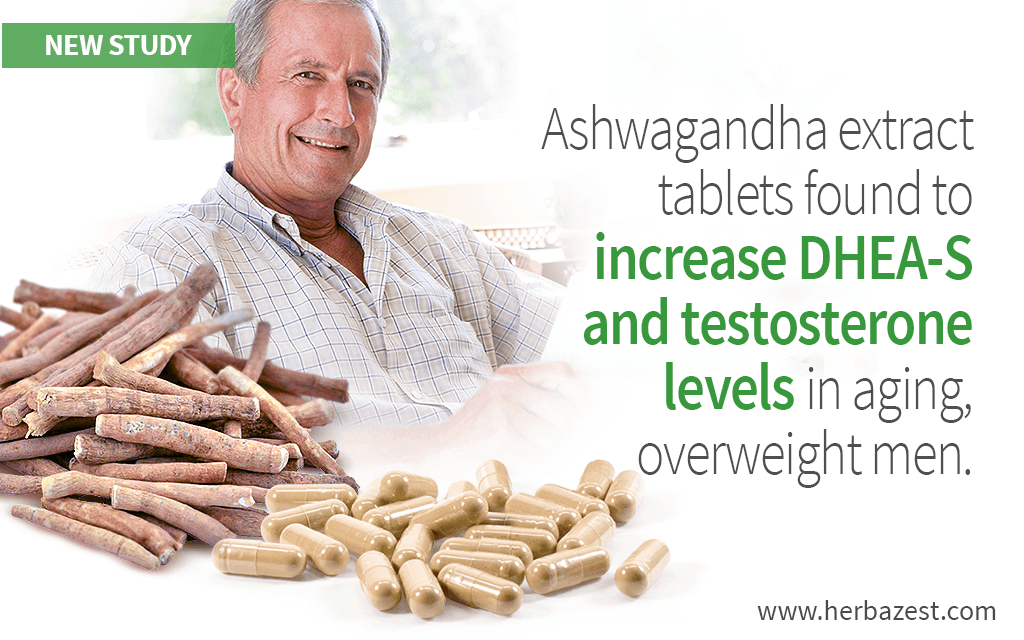While less severely than women, men undergo numerous physiological changes as they age, including higher incidence of fatigue, lower energy levels, and reduced sex drive. Obesity and age-related imbalance of male hormones, or androgens, such as DHEA-S or testosterone, are some of the main culprits of this increased morbidity and reduced life quality.1,2,3
Ashwagandha, which is one of the most important herbs in Ayurvedic medicine, is scientifically proven to have a wide array of medicinal applications, like reducing stress, promoting vigor and energy, battling fatigue, and regulating sperm production.4,5,6,7
In this study, researchers aimed to shed light on ashwagandha's benefits for men in terms of its effects on fatigue, vigor, and steroid hormones.
The Study
This 16-week randomized, double-blind, placebo-controlled crossover study involved 43 healthy men aged 40 to 70 years who reported mild-to-moderate fatigue or reduced vitality. All participants were overweight (body mass index, or BMI, between 25 and 35 kg/m2).
Men were divided into two groups: the control group receiving the placebo extract tablets and the intervention group receiving the tablets with ashwagandha extract with 10.5 mg of withanolide glycosides twice a day for eight weeks. The remaining eight weeks of the study were designed to measure the durability of changes once intervention had been discontinued.
Fatigue, vigor, and hormone measurements were taken before, throughout, and at the completion of the study via the Profile of Mood States, Short Form (POMS-SF), Aging Males' Symptoms (AMS) questionnaire, and salivary hormone tests (DHEA-S, testosterone, cortisol, and estradiol).
The Results
Compared to the placebo, the researchers observed an 18% greater increase in DHEA-S and 14.7% greater increase in testosterone levels in men receiving ashwagandha extract tablets. These beneficial effects of ashwagandha for men were more pronounced at the 8th week mark and gradually decreased over the remaining eight weeks of the trial. Cortisol and estradiol levels have not changed.
Moreover, both the control and intervention group reported improvements in fatigue, vigor, sexual, and psychological well-being, most probably due to the placebo effect.
What Does this Mean?
The results of this clinical trial show that ashwagandha can be used to regulate androgen levels in aging men naturally and without side effects as well as relieve symptoms of hormonal imbalance common to that life phase. However, ashwagandha's benefits for men can be fully reaped with continuous or more long-term use of the herb.
The study's results in terms of fatigue, stress, and vigor contrast numerous previous studies that have shown the herb's positive effects on relieving fatigue and sexual decline as well as regulating cortisol and estrogen levels. Researchers attribute this discrepancy to unique characteristics of the sample and call for further research to corroborate these effects.
Other hormone-regulating herbs for men include maca, ginkgo, ginseng, and saw palmetto.
Sources
- American Journal of Men's Health, A Randomized, Double-Blind, Placebo-Controlled, Crossover Study Examining the Hormonal and Vitality Effects of Ashwagandha (Withania somnifera) in Aging, Overweight Males, 2019
Footnotes:
- Asian Journal of Andrology. (2014). Lowered testosterone in male obesity: mechanisms, morbidity, and management. Retrieved November 6, 2019 from https://www.ncbi.nlm.nih.gov/pmc/articles/PMC3955331/
- Clinical Interventions in Aging. (2008). Testosterone for the aging male, current evidence and recommended practice. Retrieved November 6, 2019 from https://www.ncbi.nlm.nih.gov/pmc/articles/PMC2544367/
- MJA. (2006). The association between obesity and the diagnosis of androgen deficiency in symptomatic ageing men. Retrieved November 6, 2019 from https://www.mja.com.au/journal/2006/185/8/association-between-obesity-and-diagnosis-androgen-deficiency-symptomatic-ageing
- Journal of Ayurveda and Integrative Medicine. (2012). Effects of eight-week supplementation of Ashwagandha on cardiorespiratory endurance in elite Indian cyclists. Retrieved November 6, 2019 from https://www.ncbi.nlm.nih.gov/pmc/articles/PMC3545242/
- JANA. (2008). A Standardized Withania Somnifera Extract Significantly Reduces Stress-Related Parameters in Chronically Stressed Humans: A Double-Blind, randomized, Placebo-Controlled Study. Retrieved November 6, 2019 from https://blog.priceplow.com/wp-content/uploads/2014/08/withania_review.pdf
- Indian Journal of Psychological Medicine. (2012). A prospective, randomized double-blind, placebo-controlled study of safety and efficacy of a high-concentration full-spectrum extract of ashwagandha root in reducing stress and anxiety in adults. Retrieved November 6, 2019 from https://www.ncbi.nlm.nih.gov/pubmed/23439798
- Evidence-Based Complementary and Alternative Medicine. (2009). Withania somnifera improves semen quality in stress-related male fertility. Retrieved November 6, 2019 from https://www.ncbi.nlm.nih.gov/pubmed/19789214




